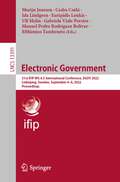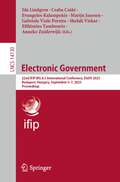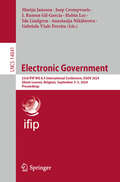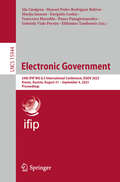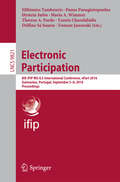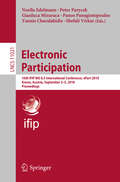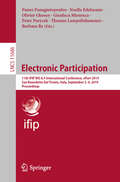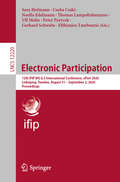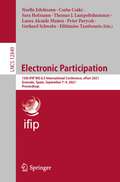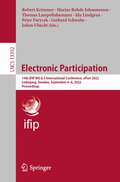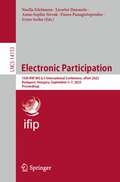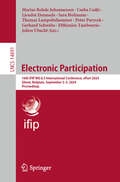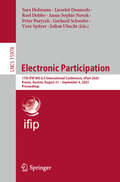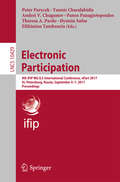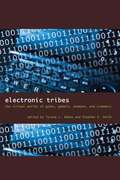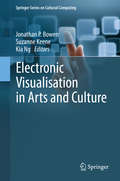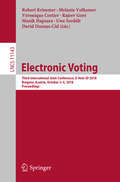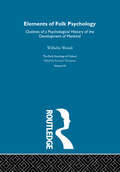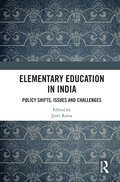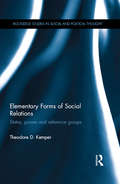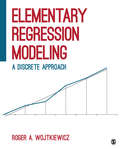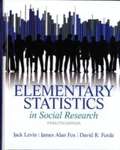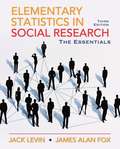- Table View
- List View
Electronic Government: 21st IFIP WG 8.5 International Conference, EGOV 2022, Linköping, Sweden, September 6–8, 2022, Proceedings (Lecture Notes in Computer Science #13391)
by Efthimios Tambouris Marijn Janssen Ida Lindgren Manuel Pedro Rodríguez Bolívar Gabriela Viale Pereira Csaba Csáki Ulf Melin Euripidis LoukisThis book constitutes the proceedings of the 21st IFIP WG 8.5 International Conference on Electronic Government, EGOV 2022, held in Linköping, Sweden, in September 2022.Chapters “Use of Commercial SaaS Solutions in Swedish Public Sector Organisations under Unknown Contract Terms”, “Towards a Research Agenda for Personal Data Spaces: Synthesis of a Community Driven Process” and “Adapting a Faceted Search Task Model for the Development of a Domain-Specific Council Information Search Engine” are available open access under a Creative Commons Attribution 4.0 International License via link.springer.com.
Electronic Government: 22nd IFIP WG 8.5 International Conference, EGOV 2023, Budapest, Hungary, September 5–7, 2023, Proceedings (Lecture Notes in Computer Science #14130)
by Efthimios Tambouris Marijn Janssen Ida Lindgren Anneke Zuiderwijk Evangelos Kalampokis Shefali Virkar Gabriela Viale Pereira Csaba CsákiThis book constitutes the proceedings of the 22nd IFIP WG 8.5 International Conference on Electronic Government, EGOV 2023, which took place in Budapest, Hungary, during September 5–7, 2023.The 28 full papers included in this book were carefully reviewed and selected from a total of 106 submissions. They were organized in topical sections as follows: Digital government; artificial intelligence, algorithms, and automation; open government and open data; smart cities, regions, and societies; innovation and transformation in government.
Electronic Government: 23rd IFIP WG 8.5 International Conference, EGOV 2024, Ghent-Leuven, Belgium, September 3–5, 2024, Proceedings (Lecture Notes in Computer Science #14841)
by J. Ramon Gil-Garcia Joep Crompvoets Marijn Janssen Ida Lindgren Habin Lee Gabriela Viale Pereira Anastasija NikiforovaThis book constitutes the proceedings of the 23rd IFIP WG 8.5 International Conference, EGOV 2024, held in Ghent, Belgium, during September 3–5, 2024. The 29 full papers presented were carefully selected from 69 submissions. They were categorized under the topical sections as follows: Foundations, Digital transformation, Public Services, AI in government, Open government, Emerging topics.
Electronic Government: 24th IFIP WG 8.5 International Conference, EGOV 2025, Krems, Austria, August 31 – September 4, 2025, Proceedings (Lecture Notes in Computer Science #15944)
by Efthimios Tambouris Panos Panagiotopoulos Marijn Janssen Ida Lindgren Manuel Pedro Rodríguez Bolívar Gabriela Viale Pereira Euripidis Loukis Francesco MuredduThis LNCS conference set constitutes the proceedings of the 24th IFIP WG 8.5 International Conference on Electronic Government, EGOV 2025, in Krems, Austria, held during August 31–September 4, 2025. The 25 full papers presented were carefully selected from 116 submissions. They were categorized under the topical sections as follows: E-Government and E-Governance; Emerging Issues and Innovations; Open Data; Smart Cities; AI, Data Analytics and Automated Decision-Making.
Electronic Participation
by Theresa A. Pardo Efthimios Tambouris Panos Panagiotopoulos Øystein Sæbø Maria A. Wimmer Yannis Charalabidis Delfina Sá Soares Tomasz JanowskiWelcometothe'rstintheePartseriesofannualinternationalconferences. ePart is dedicated to reviewing research advances in both social and technological scienti'c domains, seeking to demonstrate new concepts, methods and styles of eParticipation. ePart is dedicated to innovative and rigorous eParticipation research. It aims to bring together researchers from a wide range of academic disciplines and provide the scienti'c community with a platform for discussing and advancing research ?ndings. The conference itself is preceded by a doctoral colloquium providing young researchers with the important opportunity to be part of the eParticipation research community. This book bringstogether 16 papers representing the completed, compreh- siveresearchof41authorswithfromcountriesrangingfromSwedentoAustralia. Re'ecting on the highly complex and multi-faceted nature of eParticipation - search undertaken by these authors, the papers are clustered under the three headings: - Research Review and Outlook - Evaluation and Assessment - Tools, Techniques and Case Studies Papers include those that consider future multi-disciplinary research directions, examine the potential contribution of social networking sites to political enga- ment, provide evaluation frameworks for both eParticipation policy and speci'c projects, and those that describe emerging tools and techniques with which to conduct and analyze eParticipation. The ongoing research, projects, and general development issues, which have alsobeenacceptedforePart2009, arepublishedinacomplementaryproceedings volume by Trauner Druck, Linz, Austria.
Electronic Participation: 10th IFIP WG 8.5 International Conference, ePart 2018, Krems, Austria, September 3-5, 2018, Proceedings (Lecture Notes in Computer Science #11021)
by Panos Panagiotopoulos Yannis Charalabidis Peter Parycek Shefali Virkar Noella Edelmann Gianluca MisuracaThis book constitutes the proceedings of the 10th IFIP WG 8.5 International Conference on Electronic Participation, ePart 2018, held in Krems, Austria, in September 2018.The 12 revised full papers presented in this book were carefully reviewed and selected from 29 submissions. The papers are clustered under the following topical sections: general e-democracy and e-participation; digital collaboration and social media; policy modeling and policy informatics; and social innovation.
Electronic Participation: 11th IFIP WG 8.5 International Conference, ePart 2019, San Benedetto Del Tronto, Italy, September 2–4, 2019, Proceedings (Lecture Notes in Computer Science #11686)
by Panos Panagiotopoulos Peter Parycek Olivier Glassey Noella Edelmann Gianluca Misuraca Thomas Lampoltshammer Barbara ReThis book constitutes the proceedings of the 11th IFIP WG 8.5 International Conference on Electronic Participation, ePart 2019, held in San Benedetto del Tronto, Italy, in September 2019, in conjunction with the 18th IFIP WG 8.5 IFIP International Conference on Electronic Government (EGOV 2019) and the International Conference for E-Democracy and Open Government Conference (CeDEM 2019).The 13 revised full papers presented were carefully reviewed and selected from 26 submissions. The papers are clustered under the following topical sections: eParticipation Developments; Digital Transformations; Crisis and Emergency Management; and User Perspectives.
Electronic Participation: 12th IFIP WG 8.5 International Conference, ePart 2020, Linköping, Sweden, August 31 – September 2, 2020, Proceedings (Lecture Notes in Computer Science #12220)
by Sara Hofmann Efthimios Tambouris Peter Parycek Noella Edelmann Thomas Lampoltshammer Csaba Csáki Ulf Melin Gerhard SchwabeThis book constitutes the proceedings of the 12th IFIP WG 8.5 International Conference on Electronic Participation, ePart 2019, held in Linköping, Sweden, in August/September 2020, in conjunction with the 19th IFIP WG 8.5 IFIP International Conference on Electronic Government (EGOV 2020) and the International Conference for E-Democracy and Open Government Conference (CeDEM 2020). The conference was held virtually due to the COVID-19 pandemic. The 11 full papers presented were carefully reviewed and selected from 33 submissions. The papers are clustered under the following topical sections: eParticipation developments; digital transformation; open government and transparency; and user perspectives.
Electronic Participation: 13th IFIP WG 8.5 International Conference, ePart 2021, Granada, Spain, September 7–9, 2021, Proceedings (Lecture Notes in Computer Science #12849)
by Sara Hofmann Efthimios Tambouris Peter Parycek Laura Alcaide Muñoz Noella Edelmann Csaba Csáki Gerhard Schwabe Thomas J. LampoltshammerThis book constitutes the proceedings of the 13th IFIP WG 8.5 International Conference on Electronic Participation, ePart 2021, held in Granada, Spain, in September 2021, in conjunction with IFIP WG 8.5 Electronic Government (EGOV 2021), the Conference for E-Democracy and Open Government Conference (CeDEM 2021). The 16 full papers presented were carefully reviewed and selected from 37 submissions. The papers are clustered under the following topical sections: digital participation, digital society, digital government and legal issues.
Electronic Participation: 14th IFIP WG 8.5 International Conference, ePart 2022, Linköping, Sweden, September 6–8, 2022, Proceedings (Lecture Notes in Computer Science #13392)
by Ida Lindgren Peter Parycek Robert Krimmer Thomas Lampoltshammer Gerhard Schwabe Marius Rohde Johannessen Jolien UbachtThis book constitutes the proceedings of the 14th IFIP WG 8.5 International Conference on Electronic Participation, ePart 2022, held in Linköping, Sweden, during September 6–8, 2022, in conjunction with IFIP WG 8.5 Electronic Government (EGOV 2022), and the Conference for E-Democracy and Open Government Conference (CeDEM 2022). The 12 full papers presented were carefully reviewed and selected from 26 submissions. The papers are clustered under the following topical sections: E-democracy and e-participation; ICT & sustainability; digital and social media; legal informatics; and digital society.
Electronic Participation: 15th IFIP WG 8.5 International Conference, ePart 2023, Budapest, Hungary, September 5–7, 2023, Proceedings (Lecture Notes in Computer Science #14153)
by Panos Panagiotopoulos Noella Edelmann Lieselot Danneels Anna-Sophie Novak Iryna SushaThis book constitutes the proceedings of the 15th IFIP WG 8.5 International Conference on Electronic Participation, ePart 2023, held in Budapest, Hungary, in September 2023, in conjunction with the IFIP WG 8.5 Conference on Electronic Government (EGOV 2023) and the Conference for E-Democracy and Open Government Conference (CeDEM 2023). A total of 38 full papers has been carefully reviewed and selected from 106 submissions. Eight of the accepted papers are included in this book. They were organized in topical sections as follows: E-participation; digital transformation; digital technology; and digital sovereignty.
Electronic Participation: 16th IFIP WG 8.5 International Conference, ePart 2024, Ghent, Belgium, September 3–5, 2024, Proceedings (Lecture Notes in Computer Science #14891)
by Sara Hofmann Efthimios Tambouris Peter Parycek Thomas Lampoltshammer Csaba Csáki Gerhard Schwabe Marius Rohde Johannessen Jolien Ubacht Lieselot DanneelsThis book constitutes the refereed proceedings of the 16th IFIP WG 8.5 International Conference on Electronic Participation, ePart 2024, held in Ghent, Belgium, during September 3–5, 2024. The 15 full papers included in this book were carefully reviewed and selected from 35 submissions. The conference is dedicated to digital or electronic government, open government, local government (smart cities), smart governance, artificial intelligence (AI), e-democracy, policy informatics, and electronic participation.
Electronic Participation: 17th IFIP WG 8.5 International Conference, ePart 2025, Krems, Austria, August 31–September 4, 2025, Proceedings (Lecture Notes in Computer Science #15978)
by Sara Hofmann Peter Parycek Gerhard Schwabe Jolien Ubacht Lieselot Danneels Anna-Sophie Novak Roel Dobbe Vera SpitzerThis book constitutes the refereed proceedings of the 17th IFIP WG 8.5 International Conference on Electronic Participation, ePart 2025, held in Krems, Austria, during August 31–September 4, 2025. The 21 full papers included in this book were carefully reviewed and selected from 116 submissions.The papers were organized in topical sections as follows: Foundations and Frameworks of eParticipation; AI and Algorithmic Systems in Public Administration; Governance, Collaboration, and Policy Alignment; Local Practices, Implementation, and Innovation; Digital Services, Usability, and Citizen Interaction.
Electronic Participation: 9th IFIP WG 8.5 International Conference, ePart 2017, St. Petersburg, Russia, September 4-7, 2017, Proceedings (Lecture Notes in Computer Science #10429)
by Peter Parycek, Yannis Charalabidis, Andrei V. Chugunov, Panos Panagiotopoulos, Theresa A. Pardo, Øystein Sæbø and Efthimios TambourisThis book constitutes the proceedings of the 9th IFIP WG 8.5 International Conference on Electronic Participation, ePart 2017, held in St. Petersburg, Russia, in September 2017.The 11 revised full papers presented in this book were carefully reviewed and selected from 14 submissions. The papers reflect completed multi-disciplinary research ranging from policy analysis and conceptual modeling to programming and visualization of simulation models. They are organized in four topical threads: methodological issues in e-participation; e-participation implementations; policy modeling and policy informatics; critical reflections.
Electronic Tribes
by Stephen A. Smith Tyrone L. AdamsWhether people want to play games and download music, engage in social networking and professional collaboration, or view pornography and incite terror, the Internet provides myriad opportunities for people who share common interests to find each other. The contributors to this book argue that these self-selected online groups are best understood as tribes, with many of the same ramifications, both positive and negative, that tribalism has in the non-cyber world. In Electronic Tribes, the authors of sixteen competitively selected essays provide an up-to-the-minute look at the social uses and occasional abuses of online communication in the new media era. They explore many current Internet subcultures, including MySpace. com, craftster. org, massively multiplayer online role-playing games (MMORPGs) such as World of Warcraft, music downloading, white supremacist and other counterculture groups, and Nigerian e-mail scams. Their research raises compelling questions and some remarkable answers about the real-life social consequences of participating in electronic tribes. Collectively, the contributors to this book capture a profound shift in the way people connect, as communities formed by geographical proximity are giving way to communities - both online and offline - formed around ideas.
Electronic Value Exchange
by David L. StearnsElectronic Value Exchange examines in detail the transformation of the VISA electronic payment system from a collection of non-integrated, localized, paper-based bank credit card programs into the cooperative, global, electronic value exchange network it is today. Topics and features: provides a history of the VISA system from the mid-1960s to the early 1980s; presents a historical narrative based on research gathered from personal documents and interviews with key actors; investigates, for the first time, both the technological and social infrastructures necessary for the VISA system to operate; supplies a detailed case study, highlighting the mutual shaping of technology and social relations, and the influence that earlier information processing practices have on the way firms adopt computers and telecommunications; examines how "gateways" in transactional networks can reinforce or undermine established social boundaries, and reviews the establishment of trust in new payment devices.
Electronic Visualisation in Arts and Culture
by Jonathan P. Bowen Kia Ng Suzanne KeenePresenting the latest technological developments in arts and culture, this volume demonstrates the advantages of a union between art and science. Electronic Visualisation in Arts and Culture is presented in five parts: Imaging and CultureNew Art PracticeSeeing MotionInteraction and Interfaces Visualising HeritageElectronic Visualisation in Arts and Culture explores a variety of new theory and technologies, including devices and techniques for motion capture for music and performance, advanced photographic techniques, computer generated images derived from different sources, game engine software, airflow to capture the motions of bird flight and low-altitude imagery from airborne devices. The international authors of this book are practising experts from universities, art practices and organisations, research centres and independent research. They describe electronic visualisation used for such diverse aspects of culture as airborne imagery, computer generated art based on the autoimmune system, motion capture for music and for sign language, the visualisation of time and the long term preservation of these materials. Selected from the EVA London conferences from 2009-2012, held in association with the Computer Arts Society of the British Computer Society, the authors have reviewed, extended and fully updated their work for this state-of-the-art volume.
Electronic Voting: Third International Joint Conference, E-Vote-ID 2018, Bregenz, Austria, October 2-5, 2018, Proceedings (Lecture Notes in Computer Science #11143)
by Robert Krimmer Melanie Volkamer Véronique Cortier Rajeev Goré Manik Hapsara Uwe Serdült David Duenas-CidThis book constitutes the refereed proceedings of the Third International Joint Conference on Electronic Voting, E-Vote-ID 2018, held in Bregenz, Austria, in October 2018. The 13 full papers presented in this volume were carefully reviewed and selected from 45 submissions. The papers deal with topics connected with electronic voting including experiences and revisions of the real uses of E-voting systems and corresponding processes in elections.
Elem Folk Psyc:Esc V7 (The\making Of Sociology Ser.)
by Wilhelm WundtThis is a pre-1923 historical reproduction that was curated for quality. Quality assurance was conducted on each of these books in an attempt to remove books with imperfections introduced by the digitization process. Though we have made best efforts - the books may have occasional errors that do not impede the reading experience. We believe this work is culturally important and have elected to bring the book back into print as part of our continuing commitment to the preservation of printed works worldwide. This text refers to the Bibliobazaar edition.
Elementary Education in India: Policy Shifts, Issues and Challenges
by Jyoti RainaThis book examines the policy shifts over the past three decades in the Indian education system. It explores how these shifts have unequivocally established the domination of neoliberal capital in the context of elementary education in India. The chapters in the volume: • Discuss a range of elementary education policies and programs in India with a focus on the policy development in recent decades of neoliberalism. • Analyse policy from diverse perspectives and varied vantage points by scholars, activists, and practitioners, illustrated with contemporary statistics. • Introduce the key curriculum, assessment, and learning debates from contemporary educational discourse. • Integrate the tools and methods of education policy analysis with basic concepts in education, like equality, quantity, equity, quality, and inclusion. A definitive inter-disciplinary work on a key sector in India, this volume will be essential for scholars and researchers of education, public policy, sociology, politics, and South Asian studies.
Elementary Forms of Social Relations: Status, power and reference groups (Routledge Studies in Social and Political Thought)
by Theodore D. KemperElementary Forms of Social Relations introduces the reader to social life as a perpetual quest by individuals to gain attention, respect and regard (status) accompanied by an effort to marshal defensive and offensive means (power) to overcome the reluctance of others to grant status. This work is based on empirical evidence from many research settings showing that status and power are the main relational modes and that to understand our own and others' social behaviour, we need to understand how status and power operate in relational conduct. The status-power and reference group approach is applied to enumerate the relatively few ways in which social interaction can occur. Chapters compare the analytic value of the concept of the self with the value of reference groups that create the self. Threads of investigation include: considering the fallacy of abandoning reference groups as sources of cultural information in favour of approaches derived from cognitive neuroscience; examining a multi-person conversation from a status-power-and-reference-group stance as against a view of the same conversation based on principles of Conversation Analysis; and asserting the universality of personal status-power interests even among national leaders to name a few. By applying the author’s main theory to a range of specific cases, the author reaffirms the importance of the social to our understanding of a variety of phenomena, including the self, cultural transmission, the conduct of leaders and economic activity. This book provides readers with transparent instances of the theory in action and thus will appeal to scholars across the social sciences with interests in theory and social interaction.
Elementary Regression Modeling: A Discrete Approach
by Roger A. WojtkiewiczElementary Regression Modeling builds on simple differences between groups to explain regression and regression modeling. User-friendly and immediately accessible, this book gives readers a thorough understanding of control modeling, interaction modeling, modeling linearity with spline variables, and creating research hypotheses that serve as a conceptual basis for many of the processes and procedures quantitative researchers follow when conducting regression analyses.
Elementary Regression Modeling: A Discrete Approach
by Roger A. WojtkiewiczElementary Regression Modeling builds on simple differences between groups to explain regression and regression modeling. User-friendly and immediately accessible, this book gives readers a thorough understanding of control modeling, interaction modeling, modeling linearity with spline variables, and creating research hypotheses that serve as a conceptual basis for many of the processes and procedures quantitative researchers follow when conducting regression analyses.
Elementary Statistics In Social Research
by James Fox Jack Levin David FordeThis best-selling introduction to statistical analysis in the social sciences provides the right balance of conceptual understanding and step-by-step computational techniques. The eleventh edition of Elementary Statistics in Social Research is written to be understandable to all readers, particularly those without a strong background in mathematics. This text is available in a variety of formats - print and digital. Check your favorite digital provider for your etext, including Coursesmart, Kindle, Nook, and more. To learn more about our programs, pricing options and customization, click the Choices tab. Learning Goals Upon completing this book, readers will be able to: Develop an understanding of the importance of statistics in the social sciences.
Elementary Statistics in Social Research: The Essentials
by James Fox Jack LevinThis text provides a streamlined and accessible introduction to statistics for students in sociology, criminal justice, political science, social work, and other social sciences. This text offers an essential and accessible overview to the introduction to social statistics. Clearly written with detailed step-by-step illustrations of statistical procedures, this text provides clear and logical explanations for the rationale and use of statistical methods of social research. Numerous end-of-chapter questions in every chapter reinforce key concepts to students.
